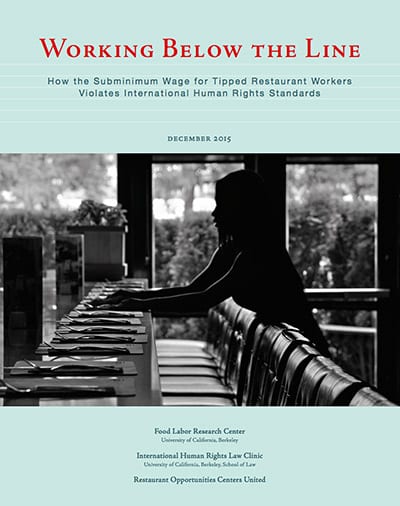Human rights experts and advocates have struck another blow against subminimum wages. A new report, Working Below the Line, claims the U.S. is violating international human rights standards in its treatment of tipped restaurant workers, most of whom live in abject poverty.
The report is a co-production of Berkeley Law’s International Human Rights Law Clinic (IHRLC), the UC Berkeley Food Labor Research Center and Restaurant Opportunities Centers United (ROC-United).
The criticism of subminimum wages is not new—momentum has been building in the U.S. to stop the “race to the bottom” for tipped workers. But this report, first released in Dec. 2015 on International Human Rights Day, shines a new and troubling light on the issue.
At a packed law school event last week, the report’s co-authors cited numerous U.S. breaches of international agreements designed to protect workers’ access to a living wage, along with basic needs such as food, healthcare and housing. The U.S. is a signatory to most of these accords, but has not ratified all of them, which means they’re not legally binding.
The failure to abide by these international standards, while keeping subminimum wage laws intact, “exposes the gap between our democratic values and what our laws and regulations actually do in practice,” said Clinical Professor Laurel Fletcher, director of IHRLC.
In the restaurant industry, tipped servers earning subminimum wages live in poverty at nearly three times the rate of the total employed U.S. population, according to the report. Women and people of color are at the bottom of the wage tier, while workers of color experience poverty at nearly twice the rate of white restaurant workers.

“Minimum wage laws need to be adequate. It’s not what the market will bear. It’s not how far you can oppress workers who are desperate for a job so that they will accept any amount of wage. It’s actually an affirmative obligation to say that minimum wages need to be sufficient so that people can live a life with dignity,” Fletcher said.
Wage theft
Tipping originated in Europe, and Americans soon mimicked the practice. But the Europeans eventually put a stop to it, seeing it as degrading and economically unfair. Although a powerful anti-tipping movement emerged in the U.S. in the late 1800s, it collapsed as the practice gained legal ground.
Federal law sets the minimum wage at $7.25 per hour. Tipped restaurant workers earn a subminimum wage of a mere $2.13 per hour. If the hourly wage plus tips doesn’t amount to the minimum, the law requires employers to pay the difference.
But tipped workers say many restaurants often fail to pay them fully and fairly. This “wage theft” occurs when an employer refuses to pay overtime, poaches tips, illegally deducts fees from paychecks, and so on. The result is “a huge and profound wage inequality,” said report co-author Evelyn Rangel-Medina ’16.
In the report, workers tell stories of scarcity, hunger, and desperation: dumpster-diving for food, unpaid sick days, sexual harassment and intimidation, and more.
“I sacrifice eating the way that I should so my daughter can have everything that she needs. … And I make sure she’s taken care of before I make sure that I am taken care of.”
25-year-old, white female bartender in Houston, TX.
“They physically have to see you, in a sick state. … It’s like you literally have to get up out of your sick day to go show your face because they won’t believe you.”
31-year-old, black female server in Troy, MI.

“I didn’t have very much money for food. You know how places throw away their food … like a pizza when no one picks it up. … I went over there, basically taking [food] from the trash.”
27-year old, white male server in Boston, MA.
Real-world consequences
One of the leading opponents of the subminimum wage is Saru Jayaraman, co-founder and co-director of the Food Labor Research Center and director of ROC-United. In a New York Times op-ed, she writes that tipping has created an unfair “two-tiered wage system with deep social and economic consequences for millions.” A 2013 ROC-United study found that restaurant servers living on tips and subminimum wages depend on food stamps at about twice the rate of the U.S. workforce.
Jayaraman is now pushing a “One Fair Wage” campaign in statehouses across the country, asking lawmakers to require restaurants to pay all employees at least the regular minimum wage. And the drumbeat is growing louder. Twenty-nine states and Washington, D.C. have hiked their minimum wages above the federal minimum, up to $10 per hour. Several cities have gone even further, including Los Angeles and San Francisco, which are gradually phasing in a $15 minimum wage.
For Rangel-Medina, the clinical work in collaboration with ROC-United offered the chance to “connect my legal education to impacting the people that I care about the most,” she said. “Transforming the restaurant industry can create a model in how we approach other sectors in the American economy to actually end the exploitation” of low-wage workers.
Legal remedies
The report recommends a number of steps policymakers can take to align restaurant working conditions with international human rights standards. On the federal level, these include:
- Supporting the Raise the Wage Act and the Pay Workers a Living Wage Act to increase the federal minimum wage and eliminate the subminimum wage for tipped workers;
- Strengthening anti-sexual harassment employment laws and enforcement efforts;
- Supporting the Schedules that Work Act to prevent arbitrary scheduling that can be used to punish workers; and
- Supporting the Healthy Families Act (earned sick days) and the Family and Medical Insurance Leave Act (paid leave).
For state and local policymakers, the co-authors similarly recommend raising the minimum wage and eliminating the tipped minimum wage, establishing earned sick days and fair scheduling policies, and strengthening protections against sexual harassment and other abuses.
To read the full report with a description of the applicable international human rights conventions, go here.
